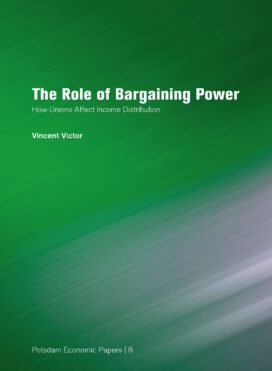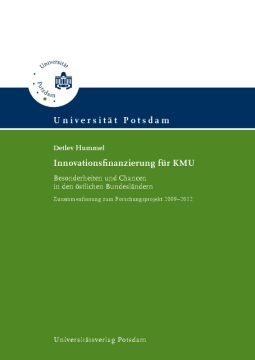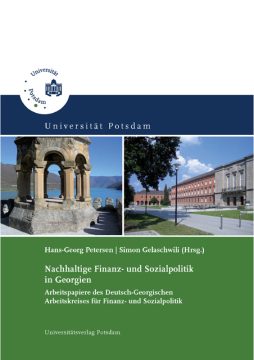Neoclassical theory omits the role of bargaining power in the determination of wages. As a result, the importance of changes in the bargaining position for the development of income shares in the last decades is underestimated. This paper presents a theoretical argument why collective bargaining power is a main determinant of workers’ share of income and how its decline contributed to the severe changes in the distribution of income since the 1980s. In order to confirm this hypothesis, a panel data regression analysis is performed that suggests that unions significantly influence the distribution of income in developed countries.
How Unions Affect Income Distribution
ISBN: 978-3-86956-449-4
59 pages
Release year 2019
Series: Potsdam Economic Papers , 6
8,00 €
Non-taxable transaction according to § 1 (1) UStG/VAT Act in combination with § 2 (3) UStG/VAT Act a. F. Providing this service, the University of Potsdam does not constitute a Betrieb gewerblicher Art/Commercial Institution according to § 1 (1) No. 6 or § 4 KStG/Corporate Tax Act. If the legal characterization of our business is changed to a commercial institution subsequently, we reserve the right to invoice VAT additionally. zzgl. Versandkosten
Neoclassical theory omits the role of bargaining power in the determination of wages. As a result, the importance of changes in the bargaining position for the development of income shares in the last decades is underestimated. This paper presents a theoretical argument why collective bargaining power is a main determinant of workers’ share of income and how its decline contributed to the severe changes in the distribution of income since the 1980s. In order to confirm this hypothesis, a panel data regression analysis is performed that suggests that unions significantly influence the distribution of income in developed countries.
Recommended Books
-
 2012
2012Mittelstands- und Innovationsfinanzierung in Deutschland
14,00 €Non-taxable transaction according to § 1 (1) UStG/VAT Act in combination with § 2 (3) UStG/VAT Act a. F. Providing this service, the University of Potsdam does not constitute a Betrieb gewerblicher Art/Commercial Institution according to § 1 (1) No. 6 or § 4 KStG/Corporate Tax Act. If the legal characterization of our business is changed to a commercial institution subsequently, we reserve the right to invoice VAT additionally.
zzgl. Versandkosten
Add to cart -
 2011
2011Elemente der Neuen Ökonomischen Geographie
8,00 €Non-taxable transaction according to § 1 (1) UStG/VAT Act in combination with § 2 (3) UStG/VAT Act a. F. Providing this service, the University of Potsdam does not constitute a Betrieb gewerblicher Art/Commercial Institution according to § 1 (1) No. 6 or § 4 KStG/Corporate Tax Act. If the legal characterization of our business is changed to a commercial institution subsequently, we reserve the right to invoice VAT additionally.
zzgl. Versandkosten
Add to cart -
 2013
2013Innovationsfinanzierung für KMU
7,50 €Non-taxable transaction according to § 1 (1) UStG/VAT Act in combination with § 2 (3) UStG/VAT Act a. F. Providing this service, the University of Potsdam does not constitute a Betrieb gewerblicher Art/Commercial Institution according to § 1 (1) No. 6 or § 4 KStG/Corporate Tax Act. If the legal characterization of our business is changed to a commercial institution subsequently, we reserve the right to invoice VAT additionally.
zzgl. Versandkosten
Add to cart -
 2008
2008Simon Gelaschwili, Hans-Georg Petersen
Nachhaltige Finanz- und Sozialpolitik in Georgien
10,50 €Non-taxable transaction according to § 1 (1) UStG/VAT Act in combination with § 2 (3) UStG/VAT Act a. F. Providing this service, the University of Potsdam does not constitute a Betrieb gewerblicher Art/Commercial Institution according to § 1 (1) No. 6 or § 4 KStG/Corporate Tax Act. If the legal characterization of our business is changed to a commercial institution subsequently, we reserve the right to invoice VAT additionally.
zzgl. Versandkosten
Add to cart
Contact
Potsdam University Library
University Press
Am Neuen Palais 10
14476 Potsdam
Germany
verlag@uni-potsdam.de
0331 977-2094
0331 977-2292





